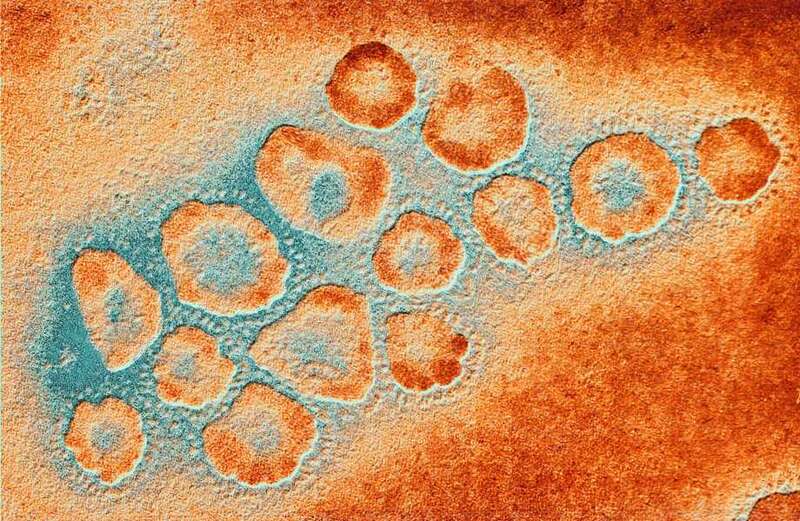AN alarming number of pneumonia cases have been detected in the Sweden and Switzerland, echoing a similar surge in China.
It comes just as Denmark and the US reported a stark rise in cases of a similar respiratory virus in children.


As many as 145 people in Sweden have been sickened by mycoplasma pneumonia from April through September, according to a study published last week.
The same report revealed that Switzerland had seen 132 cases and Singapore 172.
Meanwhile, Ohio county in the US reported a paediatric outbreak of pneumonia, including several cases of mycoplasma pneumonia, a mild version of the disease.
 Spectacular New Year fireworks light up London sky as huge crowds celebrate across UK for first time in three years
Spectacular New Year fireworks light up London sky as huge crowds celebrate across UK for first time in three years
On Thursday, the Warren County Health District said it has had an unusually high number of paediatric pneumonia cases this autumn: 145 since August.
The average patient is around eight years old, according to the district, and the most common symptoms have been cough, fever and fatigue.
In a joint statement, health commissioner Duane Stansbury, and Doctor Clint Koenig, of Ohio Health Riverside Methodist Hospital, said: "We do not think this is a new respiratory disease but rather a large uptick in the number of pneumonia cases normally seen at one time."
Meanwhile, Denmark is battling its pneumonia cluster, according to the Statens Serum Institut (SSI), a Copenhagen-based research group that's part of the Danish Ministry of Health.
There were 541 cases of mycoplasma pneumonia in the week ending November 26.
This was up 222 per cent from the 168 recorded five weeks earlier, during the week ending October 22.
Hanne-Dorthe Emborg, an SSI researcher, said: "There is widespread infection throughout the country."
She added: "The number of new cases has increased significantly [in recent weeks], and we are now seeing significantly more cases than usual."
'We've been waiting for this'
However, Hanne-Dorthe said the rise in cases was expected, as immunity against the bugs dropped across populations during Covid lockdowns.
Fewer social interactions during the pandemic meant the bacterium had few opportunities to spread, meaning people didn't develop protection.
 Hospitals run out of oxygen and mortuaries full amid NHS chaos
Hospitals run out of oxygen and mortuaries full amid NHS chaos
Now more people are mixing again, the bugs can spread more easily.
She said: "For the past four years, the number of mycoplasma infections has been extremely low, and it is not unusual that we have an epidemic now."
Countries traditionally have upticks in mycoplasma pneumonia every few years, so some outbreaks may be part of the seasonal ebb and flow of respiratory illnesses.
Hanne-Dorthe, added: "We have actually been waiting for it since we closed the country after the Covid-19 pandemic."
UKHSA is closely monitoring the situation
Professor Dame Jenny Harries
Pneumonia - inflammation of the lungs — is typically caused by a bacterial or viral infection and gets better within two weeks.
Mycoplasma pneumonia is sometimes called white lung syndrome because of how lung damage appears on scans.
The bug can cause some people to become very unwell, especially the over 65s, babies or young children and those with lung conditions.
The surge mirrors events unfolding in China, where an unspecified virus is infecting hundreds of children.
Hospitals in Beijing are overflowing with youngsters lying on floors while hooked up to IVs after showing symptoms such as inflammation in the lungs and a high fever but no cough.
This, and rising case numbers in the Netherlands, has sparked fears other countries, including the UK, could be impacted over Christmas.
The UK Health Security Agency (UKHSA) said it is "closely monitoring" the situation.
Professor Dame Jenny Harries, chief executive, said: "We need to keep an open mind about the cause of any increased reporting of clusters of disease, including of this illness in Chinese children.
"UKHSA is closely monitoring the situation and will continue to work with international partners to assess the emerging information as it becomes available."
India, Indonesia, Nepal, Taiwan, Thailand and Vietnam have also been alerted to check for any likely similar outbreak.
The WHO officially requested "detailed" information last week as cases continued to rise.
ProMed - a system that monitors global disease outbreaks and was one of the first groups to identify the dangers of coronavirus - issued a warning on November 22.
Pneumonia in the UK
More people die from pneumonia in the UK than anywhere in Europe.
Most are elderly, but the lung condition can be serious in children, too.
According to the charity Asthma + Lung, around 700 kids get it in the UK each year and may have a cold or flu first.
Dr Simon Theobalds, GP at Pall Mall Medical, said: "Pneumonia is an inflammatory lung condition impacting the air sacs and is frequently triggered by bacterial, viral or other microbial infections.
"It's crucial to be vigilant for specific signs that distinguish it from other childhood viruses.
"While symptoms may overlap, pay attention to persistent high fever, rapid breathing and chest retractions.
"Keep an eye out for symptoms like a cough, chest pain and difficulty breathing."
The duration and intensity of symptoms can help differentiate pneumonia from other common viruses, such as bronchitis.
Dr Theobalds said: "If the symptoms persist and escalate, seek urgent medical attention.
"Healthcare professionals can perform necessary tests such as blood tests and X-rays to determine an appropriate course of treatment."
The expert added that a timely diagnosis and antibiotics can improve the chances of recovery.


































